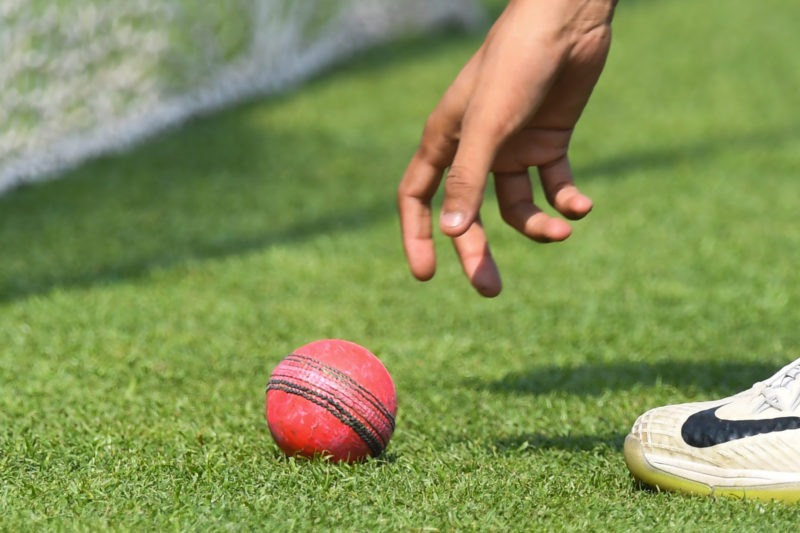Four years on, traditionalist India joins cricket’s pink-ball party
Both teams have been training with the pink ball ahead of the first day-night Test in India (Dibyangshu SARKAR)
Kolkata (AFP) – India will become the last major cricketing nation to enter the pink-ball Test era Friday after long resisting innovations to the five-day format.
The second Test against Bangladesh in Kolkata will be a day-night affair — partly played under floodlights, and with a pink ball rather than red for better visibility.
Day-night Tests, aimed at increasing crowds and TV audiences for the five-day games, were successfully introduced in 2015 but India has balked at joining the party.
India’s new cricket chief Sourav Ganguly had to work hard to convince both teams to play under floodlights but he has now arranged a grand spectacle at Kolkata’s Eden Gardens.
Virat Kohli’s India appear in little danger of losing the ground-breaking fixture, as they already lead the two-match series 1-0 after a crushing win in Indore.
The Board of Control for Cricket in India has kept away from day-night Tests since the first pink ball game in Adelaide between Australia and New Zealand in 2015. It refused to play a Test under lights in Australia last year.
England, Pakistan, South Africa, Sri Lanka and West Indies have all played at least one day-night Test but the BCCI, by far the richest and most powerful board in world cricket, dodged it, reportedly due to a negative player feedback.
It echoes India’s resistance to the Decision Review System, which it belatedly embraced years after the technology had become standard in other countries.
Despite the delayed introduction, former India captain Sunil Gavaskar told AFP that the future is bright for pink-ball games.
“When day-night cricket started not many thought it would be successful but look at the huge following it has now, so there’s no reason to believe that day night Test cricket won’t be successful too,” said Gavaskar.
“The only thing I feel is that the stats for pink-ball Test cricket should be separately maintained from red-ball cricket.
“Similarly for limited-overs cricket also the stats should be separate for red-ball and white-ball, or some sort of distinction made so that future generations can know what was what.”
– Dew diligence –
Bangladesh Prime Minister Sheikh Hasina and West Bengal chief minister Mamata Banerjee will ring the bell at the start of the game at Kolkata’s famous Eden Gardens ground.
Kohli said the change of colour will test the batsmen as the pink balls behave differently than the red ones used in day-time Tests.
“The pink-ball Test is going to be exciting, will be a challenge for the batters. With the older ball, it doesn’t swing that much so the bowlers will have a challenge,” Kohli said after their opening win.
“We’re just happy to be among the first to play pink-ball cricket for India.”
India have experimented with pink balls in domestic cricket, including a club game in Kolkata. But not many players in the current squad are used to the new balls, which were tested during hurriedly organised net sessions during the first Test.
But Gavaskar said Kohli’s team — which leads the world Test championship table and is aiming to secure a 12th straight series win at home — can conquer any facet of the game.
“This is a magnificent Indian team which can find a way to win even if they are playing on the snow in Iceland or sand in the Sahara desert,” said Gavaskar.
“So it does not matter whether any of the players have played earlier with the pink ball or not.”
Former Australia umpire Simon Taufel said “adaptability” will be key for players and officials when the colour of the ball will appear to change during twilight.
“We need to adapt just like everybody else. I stood in a pink-ball trial at Lord’s and it was different,” Taufel told AFP.
“Because colour is light and when you put that pink ball through broad daylight, through twilight period and under lights the colour changes.”
The match will be played from 1:00 pm to 8:00 pm (0700 to 1430 GMT), avoiding the worst of the dew that hits the region in winter months.
Disclaimer: Validity of the above story is for 7 Days from original date of publishing. Source: AFP.


